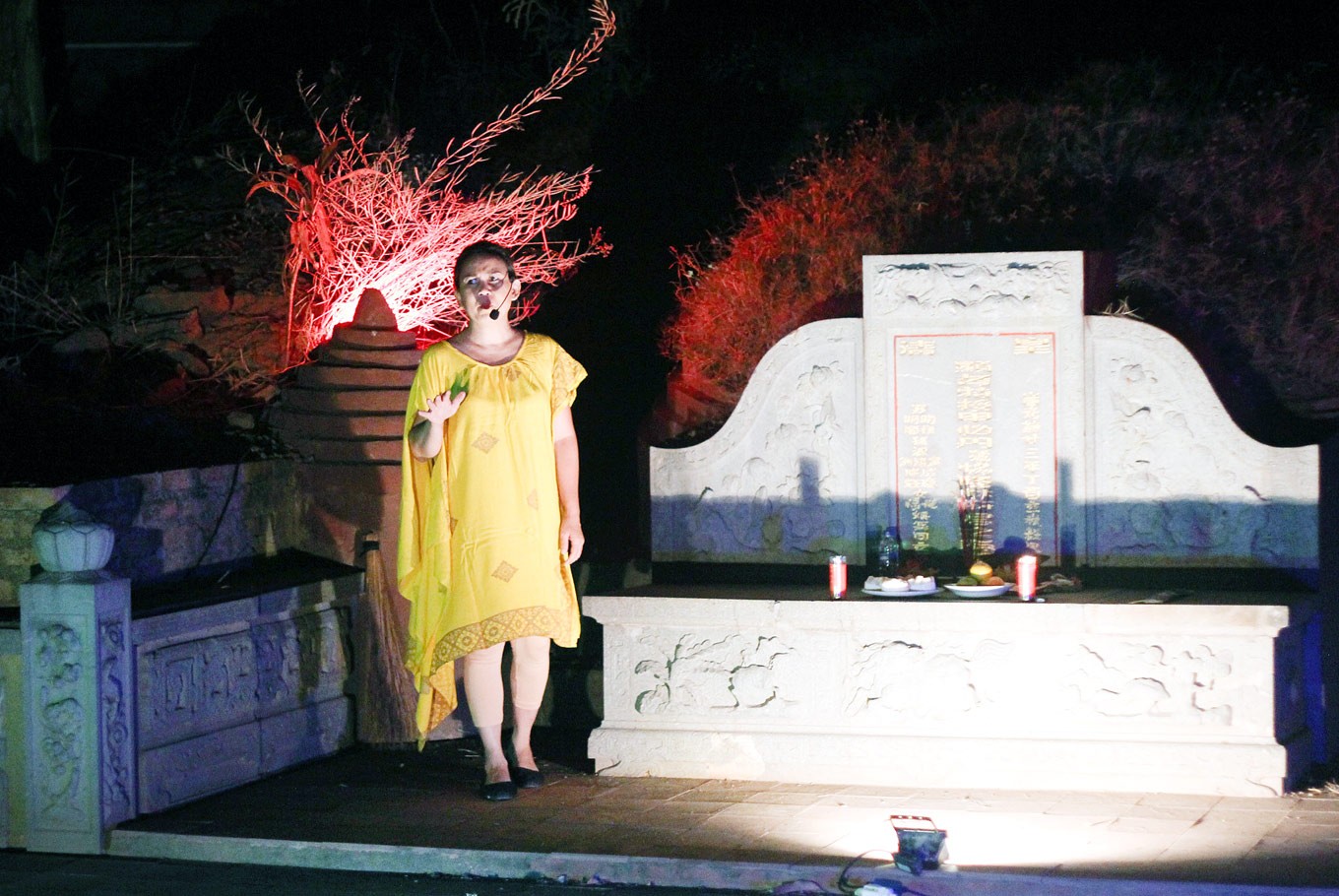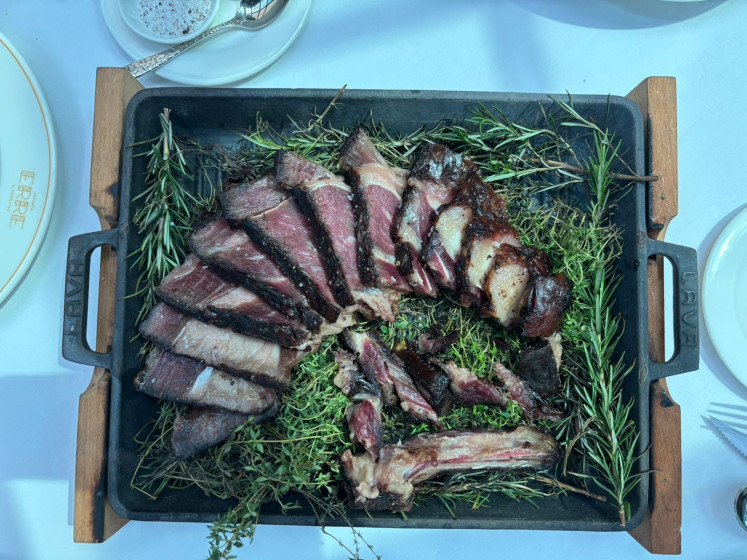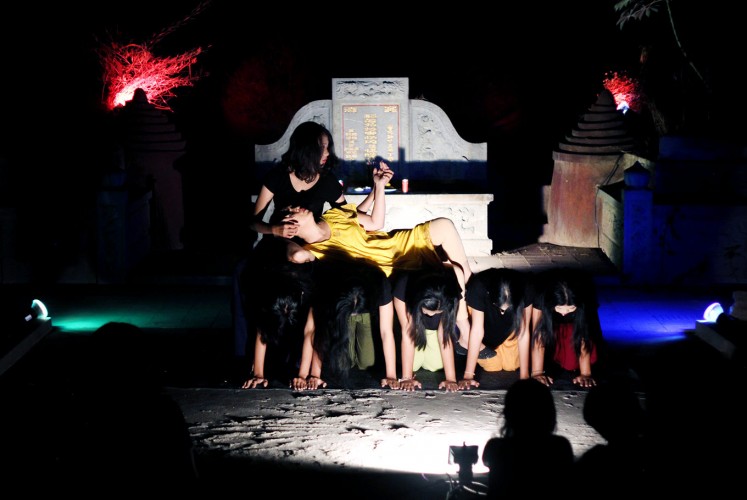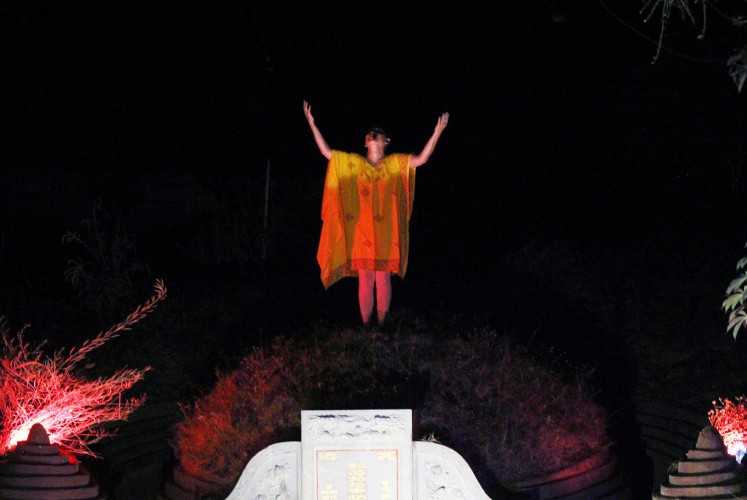Popular Reads
Top Results
Can't find what you're looking for?
View all search resultsPopular Reads
Top Results
Can't find what you're looking for?
View all search resultsThe league of extraordinary women
A theater project provides a stage for “common” mothers and housewives to share their struggles.
Change text size
Gift Premium Articles
to Anyone
A
woman in yellow quietly passed front of a Chinese tomb. She stood timidly in front of the tomb. Behind her was a huge headstone bearing the name of her great-great-grandfather in lacquered gold letters.
“If you ask me to which ethnic group I belong, I won’t be able to answer instantly [...] If you ask me to which religious creed I belong, I won’t be able to answer directly,” she whispered softly.
In the following 30 minutes, she narrated her personal journey as a Java-born Balinese of Chinese descent who later married a Balinese Hindu man. Her name is Hermawati.
It is a narrative on identity, or to be precise, a perennial search for it. In Bali, one’s identity and thus one’s existence are closely tied to one’s ancestry. That’s why soroh (clan-based organization) and kawitan (ancestral spirits and worship) occupy a very important position in the life of Balinese people.
Soroh and kawitan are the existential root for the Balinese. Without the knowledge of that root, one would be forever deemed as incomplete.
A Balinese woman upon marriage would assume the clan and worship the ancestral spirits of her husband. For Hermawati, the notion of leaving her own lineage behind to assume her husband’s spurred so many questions on identity, ethnicity and spirituality.
She even wondered whether she would have a place in the afterlife and whether that place would be Chinese or Balinese in nature.
Hailing from an illustrious family — her great-great-grandfather Liem Liang An was a 19th century Kapitan Cina (Captain of the Chinese, a high-ranking government position) in Singaraja, a coastal town in northern Bali — she feels the romantic devotion to continue to bow to her Chinese ancestors.
At the end of her narrative, Hermawati conceded that her struggle was an ongoing one and most of her questions had yet to be resolved.
“But I have begun to see that my kawitan is the limitless sky, and to honor my Chinese ancestors, I have changed my name to Herma Liem,” she said.
Hermawati’s performance that night displayed how a novel approach could breathe fresh air onto a stage. Having a non-actor staging a performance based on that person’s real-life stories resulted in a genuinely moving piece.
Moreover, staging the performance at Hermawati’s family cemetery instead of at a dedicated theatrical venues lent the performance its authentic atmosphere.
It also placed Hermawati in a familiar place, thus boosting her confidence significantly.
“My grandfather, grandmother and an uncle were all buried here and I feel they are with me tonight,” she said.
That novel approach is the core of 11 Ibu, 11 Panggung, 11 Kisah (11 Mothers, 11 Stages, 11 Stories), an ongoing theater project in Singaraja.
Funded by the Ford Foundation, the project aims to present 11 performances by 11 women who have little or absolutely no stage experience. Each of them would perform the story of her own life.
Hermawati’s performance was the third piece of the project. The first was by Erna Dewi, a tarot reader, and the second by Watik, a construction worker.
The project is the brainchild of Sonia Piscayanti, a university lecturer and one of Bali’s leading writers.
A feminist whose poems and short stories have dealt with issues ranging from discrimination and rebellion to sexual escapade, Sonia strives to set the project as the stage for the “common” womsn.
“The idea [for the project] was based on my observations [on] how mothers and housewives are both the most delicate and strongest group of people,” she said.
This group of people tends to keep their pains and struggles to themselves. They frequently find themselves so immersed in the problems of family members that they have no time to deal with their own issues.
Furthermore, in a patriarchal society, mothers and housewives are rarely given a chance to voice their opinions.
“When they eventually do speak, they are often ignored,” Sonia said. “The project will be a platform for them to get their voices heard.”
She searched for mothers and housewives who could fill the stage with their stories and quickly discovered amazing women, ranging from a construction worker and self-taught fashion designer to a university professor.
Their personal lives are colorfully different; some are happily married, a few experienced multiple divorces and one suffered domestic violence.
Yet they all display a similar strength of character — equal parts pride and tenacity — that pushed them through all of life’s adversities.
Freedom: In the end, she declares that the limitless sky is her true origin and ancestor. (Komunitas Mahima/File)Sonia rigorously interviewed the women to draft a working script of their performances, which she also directed.
“It is not an easy process, particularly the part when we have to convince them to overcome their natural timidity to perform before a live audience,” she said.
In the end, it was a truly rewarding process. The participating mothers gradually learned that they all faced a similar struggle. That realization has created a strong bond that saw them support and comfort each other on and off the stage.
Sonia and the audience, meanwhile, learned firsthand about the magnitude of a mother’s perseverance and compassion.
“They are the true, unsung heroes of our time,” Sonia said.













